
Faust's first 1971 release, remastered and repackaged, bringing this incredibly creative band's unexpected and unusual rock opus available again in all it's idiosyncratic glory.
Out of Stock
Quantity in Basket: None
Log In to use our Wish List
Shipping Weight: 5.00 units
Sample The Album:
Werner Zappi Diermaier-Drums
Hans Joachim Irmler - Organ
Jean Jacques Avenel-Hervé Peron
Rudolf Sosna - Guitar and Keyboards
Gunther Wüsthoff - Synthesiser and Sax
Arnulf Meifurtt - Drums
Kurt Graupner
Voices: Carrot - Florentine Papst
Meadow Meal - Peron, Sosna
Said the Angel to the Queen - Peron, Meifert
Click an artist name above to see in-stock items for that artist.
UPC: 752725011921
Label: Recommended Records
Catalog ID: RER F6
Squidco Product Code: 4457
Format: CD
Condition: New
Country: Great Britain
Packaging: Digipack
Recorded at Wümme 1971
"The first 1971 Polydor (transparent) album and one of the great testaments to originality and innovation in the field. Two years in the making. A breathtaking achievement that hasn't aged. Remastered, repackaged."-ReR Megacorp
Artist Biographies
• Show Bio for Werner Zappi Diermaier "Werner Diermaier (also known as Werner "Zappi" Diermaier) is a German drummer, best known as one of the founding members of the German krautrock band, Faust. Diermaier has remained with Faust for its entire lifespan and appears on all of their over 30 albums. In 1969 Diermaier was a member of a German rock band called Campylognatus Citelli, with Hans Joachim Irmler (keyboards) and Arnulf Meifert (percussion). Later that year in Hamburg, at the suggestion of journalist and record producer Uwe Nettelbeck, they joined forces with another German rock group, Nukleus comprising Jean-Hervé Péron (bass guitar), Rudolf Sosna (guitar) and Gunter Wüsthoff (saxophone). The sextet became known as Faust and under the direction of Nettelbeck, they converted an old school-house near the village of Wümme, between Hamburg and Bremen into a studio, where they began working on their first album." ^ Hide Bio for Werner Zappi Diermaier • Show Bio for Hans Joachim Irmler "Born in 1950, Hans-Joachim Irmler began experimenting with sound-generating technology at a very early age. As a teenager, he built his first organ. In 1969, he moved to Hamburg, where he studied art and worked for television. There, he was drawn into a collective of musicians and filmmakers. Out of this loose group, a band crystallized which would become known as Faust - a band which subsequently became known to people with an interest in avantgarde music all around the world. The band negotiated a contract with Polydor in 1971 in which they were granted their own studio and custom-built sound-processing equipment (unheard of for a "pop" or "rock group" at that time). On their eponymous debut in 1971 (pressed on clear vinyl and housed in a transparent cover), one can hear familiar sounds augmented with electronically generated and distorted ones, which made Faust into probably the most far-out album ever released on a major label. This musical and technological transmutation has become the leitmotiv of Irmler's aesthetic. He always worked with self-built or heavily customized equipment. Thus it is small wonder that when Faust folded in 1975 he started his own keyboard workshop. But Faust never really stopped, there were always reunions - sometimes private, sometimes public. In 1994, he and two other core-members of Faust record Rien, the first album in 20 years,. It was produced by Jim O'Rourke and released on Jeff Hunt's Table Of Elements, one of the prime labels for so-called post-rock in the 90s. Irmler went on to form his own label Klangbad in 1996, on which he published not only Faust, but also other bands, most of whom he recorded in the label's own studio (including Custer, Dieter Moebius, Circle, Ectogram, Nightingales, Ole Lukkye, to name but a few) . In 2004, the studio relocated to the premises of a disused paper factory in the rural Swabian village Scheer. It contains all of Irmler's equipment built over the last 30 years as well as new, computer-based recording tools. Initially established as a thank you-party for the volunteers who helped in building the new studio, Irmler now runs and curates the internationally acclaimed Klangbad Festival. Since 2004, this annual event attracts audacious locals as well as international music lovers from all over the globe. After he recorded and released his first solo-album Lifelike in 2003, Irmler has embarked on a long series of improvisations and collaborations with other musicians, among them musician, composer and multimedia artist Alfred 23 Harth (Harth/Irmler/Müller - Taste Tribes on For4ears records), the percussionist Z'ev (on the Fauz't-CD), drummers Christian Wolfarth and Lucas Niggly (the latter of Steamboat Switzerland-fame), Hans Reichel (guitarrist extraordinaire & inventor of the Daxophone) and trumpeter Franz Hautzinger." ^ Hide Bio for Hans Joachim Irmler • Show Bio for Jean Jacques Avenel "Jean-Jacques Avenel, born 16 June 1948 in Saint-Nicolas-d'Aliermont ( Seine-Maritime ) and died 12 August 2014. He was a jazz bassist, a faithful companion to Steve Lacy, and participated in many other musical adventures. He was interested especially in African music, the kora and tradition Mandingo. Jean-Jacques Avenel was self-taught, although he subsequently benefit from the lessons of Kent Carte. He began his career by participating in the free jazz movement, playing with Steve Waring, Colette Magny, Don Cherry, and with Noah Howard, the quartet of Frank Wright and Intercommunal Free Dance Music Orchestra training François Tusques. He also accompanies the saxophonist Daunik Lazro. From 1975, he began to be associated with different formations led by Steve Lacy. Trio, sextet, quartet... But also the quintet consisting addition Lacy and Avenel, saxophonist Steve Potts, drummer Oliver Johnson and pianist Bobby Few, often with the singer Irene Aebi. A long collaboration begins. He accompanied Steve Lacy for nearly 30 years, performing in many festivals and other places in Europe and the United States, and participating in more than twenty albums recordings. He had also the opportunity to accompany Butch Morris in 1980, and David Murray in the 1990s. He participated in the achievements of Michel Edelin and particularly in the quartet with Simon Goubert and Jacques Di Donato since 1995. More recently, he worked with young European pianists Benoît Delbecq, and Gael Mevel. And with American Mal Waldron and Australian Chris Cody. Plus work with Richard Galliano, George Lewis, Pharoah Sanders, Archie Shepp, Dino Saluzzi, Paul Bley, and other. He also regularly collaborated with François Raulin. In 2000, at the 38th festival Roaring, Avenel, Raulin and Adama Drame together created the ARD trio, training mixing European jazz tradition and the Mandingo. Jean-Jacques Avenel passion for African music and plays the kora, in addition to the bass. In 2004, Avenel and Sissokho surrounded themselves Lansiné Kouyaté, Moriba Koita and Michel Edelin for Waraba project ( "the lion" in language Bamana ). Then in 2006, he formed the trio DAG Domancich and Simon Goubert. He died of cancer August 12, 2014." ^ Hide Bio for Jean Jacques Avenel
11/18/2024
Have a better biography or biography source? Please Contact Us so that we can update this biography.
11/18/2024
Have a better biography or biography source? Please Contact Us so that we can update this biography.
11/18/2024
Have a better biography or biography source? Please Contact Us so that we can update this biography.
Track Listing:
1. Why Don't You Eat Carrots 9:35
2. Meadow Meal 8:19
3. Miss Fortune (live) 16:36
Recommended Records
Song Based Music
RIO (Rock in Opposition)
European Improvisation and Experimental Forms
Rock and Related
Search for other titles on the label:
Recommended Records.


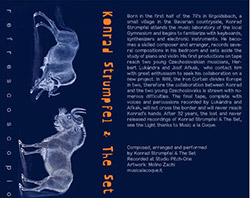
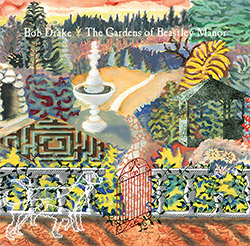
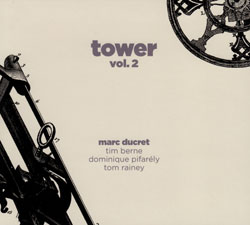
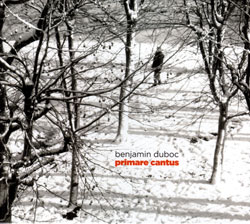
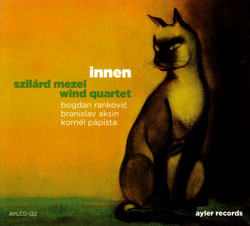
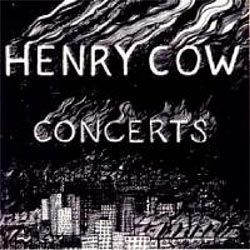
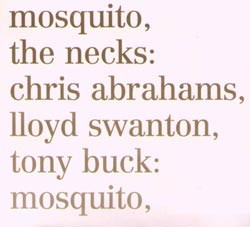
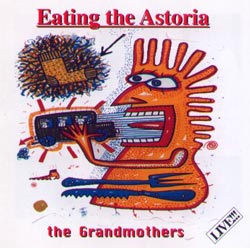
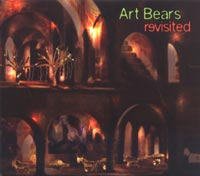
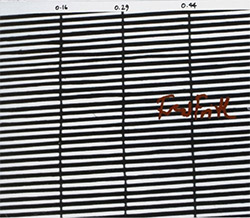
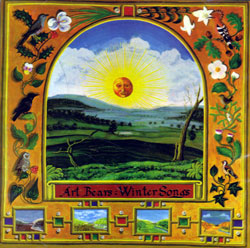
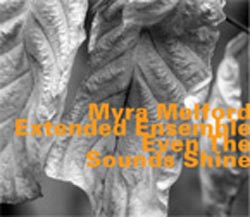
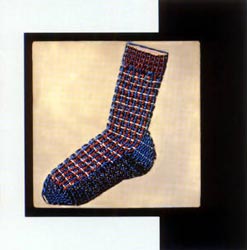
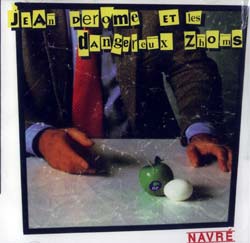
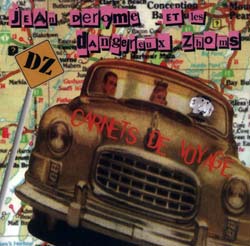
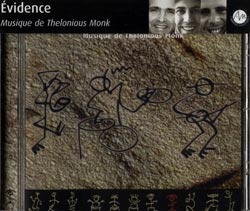














![Barker / Parker / Irabagon: Bakunawa [VINYL]](https://www.teuthida.com/productImages/misc4/35533.jpg)
![Blaser, Samuel / Marc Ducret / Peter Bruun: Dark Was The Night, Cold Was The Ground [VINYL 10-inch]](https://www.teuthida.com/productImages/misc4/35492.jpg)










![Warren, Kenny (Warren / Hoffman / Ellman): Sweet World [VINYL]](https://www.teuthida.com/productImages/misc4/35451.jpg)


![Blake, Ran / Dave Knife Fabris: Live Amsterdam 2006, First Visit [CD + POSTCARDS]](https://www.teuthida.com/productImages/misc4/35275.jpg)
![Sanna, Claudio: Compositori Sardi Contemporanei II [2 CDs]](https://www.teuthida.com/productImages/misc4/35317.jpg)












![Nevai, Nandor: <<The PRICE of FRONTIER>> Book 1: FULK [BOOK + 4 CDs]](https://www.teuthida.com/productImages/misc4/35464.jpg)
![Nevai, Nandor: <<The PRICE of FRONTIER>> Book 2: MARTIAL [BOOK + 4 CDs]](https://www.teuthida.com/productImages/misc4/35465.jpg)
![Nevai, Nandor: <<The PRICE of FRONTIER>> Book 3: JASSOM [BOOK + 4 CDs]](https://www.teuthida.com/productImages/misc4/35466.jpg)
![Nevai, Nandor: <<The PRICE of FRONTIER>> Book 4: HARD-WON [BOOK + 4 CDs]](https://www.teuthida.com/productImages/misc4/35467.jpg)






![DNS: Taking Big Bites Of The Khandas Three Cafes Deep [2 CDs]](https://www.teuthida.com/productImages/misc4/35334.jpg)




![Cleaver, Gerald: The Process [VINYL]](https://www.teuthida.com/productImages/misc4/34966.jpg)




![Alva Noto: HYbr:ID II [VINYL 2 LPs]](https://www.teuthida.com/productImages/misc4/35201.jpg)

![Baron, Derek / Luke Martin: Distinct and Concealed [CASSETTE + DOWNLOAD]](https://www.teuthida.com/productImages/misc4/35079.jpg)

![Lyle, Erica Dawn : Colonial Motels [CASSETTE + DOWNLOAD]](https://www.teuthida.com/productImages/misc4/35080.jpg)







![Alva Noto: HYbr:ID III [VINYL 2 LPs]](https://www.teuthida.com/productImages/misc4/35011.jpg)
![Kubisch, Christina / Trondheim Voices: Stromsanger 2022 For Six Voices And Electromagnetic Waves [VINYL]](https://www.teuthida.com/productImages/misc4/34628.jpg)








![Zurria, Manuel: Fame di Vento [3 CDs]](https://www.teuthida.com/productImages/misc4/35167.jpg)

![Granberg, Magnus / Nattens Inbrott / Skogen: Holde Traume, Kehret Wieder! [2 CDs]](https://www.teuthida.com/productImages/misc4/35038.jpg)
![Frey, Jurg: Outermost Melodie [2 CDs]](https://www.teuthida.com/productImages/misc4/35039.jpg)

![Pavone, Jessica: Reverse Bloom [VINYL]](https://www.teuthida.com/productImages/misc4/34895.jpg)




![Modney (Modney / Wooley / Gentile / Roberts / Pluta / Symthe / ...): Ascending Primes [2 CDs]](https://www.teuthida.com/productImages/misc4/34852.jpg)








![Elephant9 with Terje Rypdal: Catching Fire [VINYL 2 LPs]](https://www.teuthida.com/productImages/misc4/35355.jpg)
![Deerlady (Obomsawin, Mali / Magdalena Abrego): Greatest Hits [VINYL]](https://www.teuthida.com/productImages/misc4/34876.jpg)




![Haino, Keiji: Black Blues [2 CDs]](https://www.teuthida.com/productImages/misc4/35109.jpg)



![Surplus 1980: Illusion of Consistency [CD]](https://www.teuthida.com/productImages/misc4/35069.jpg)
![Staiano, Moe: Away Towards the Light [VINYL + DOWNLOAD]](https://www.teuthida.com/productImages/misc4/35037.jpg)




![Caveira (Gomes / Sousa / Abras / Ferrandini): Ficar Vivo [VINYL]](https://www.teuthida.com/productImages/misc4/34643.jpg)
![Gregg, J. J. / David Van Auken: Lunar Prairie [CD w/ DOWNLOAD]](https://www.teuthida.com/productImages/misc4/34611.jpg)

![Coultrain: Mundus [VINYL]](https://www.teuthida.com/productImages/misc4/32439.jpg)
![Mattin: Songbook #6 [VINYL]](https://www.teuthida.com/productImages/misc4/27317.jpg)
![Punkappella: Wake Up [7-inch VINYL]](https://www.teuthida.com/productImages/misc4/17519.jpg)
![Residents, The: WARNING: UNiNC.: Live And Experimental Recordings 1971-1972 [VINYL 2 LPs]](https://www.teuthida.com/productImages/misc4/31521.jpg)
![Coultrain: Phantasmagoria [VINYL]](https://www.teuthida.com/productImages/misc4/30142.jpg)
![Lennon, Sean Ono: Asterisms [VINYL]](https://www.teuthida.com/productImages/misc4/34517.jpg)

![Rotem Geffen: The Night Is The Night [VINYL]](https://www.teuthida.com/productImages/misc4/34631.jpg)
![Coley, Byron: Dating Tips for Touring Bands [VINYL]](https://www.teuthida.com/productImages/misc4/17906.jpg)

![Lost Kisses: My Life is Sad & Funny [DVD]](https://www.teuthida.com/productImages/misc4/lostKissesDVD.jpg)